The internet nearly collapsed Monday evening under the weight of anger and indignation from Winnipeg Jets fans who’d found out their team had traded Jacob Trouba to the New York Rangers in exchange for Neal Pionk and the 20th-overall pick in the 2019 NHL Entry Draft. Most consider it a poor return for the 25-year-old d-man entering the prime of his career.
It may have been Rangers fans who kept the world wide web from descending into an abyss of negativity. Blueshirts rooters were rejoicing all over social media, at their team’s acquisition of the top-pairing, minute-eating blueliner as somewhere between a solid win and highway robbery.
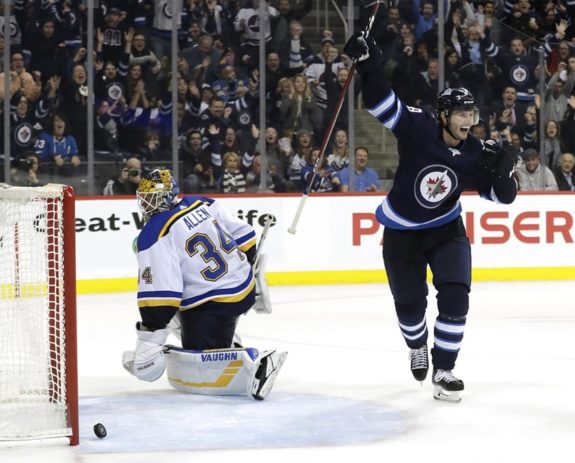
At first glance, it appears the Rangers got the better of the Jets in the deal, and it’s hard to believe it was the best offer Jets general manager Kevin Cheveldayoff received for his prime asset given the number of suitors available.
While the trade seems disappointing for the Jets (getting one more prospect or pick from the Rangers would have made it seem more even), and the Rangers will get a more immediate boost from it, there are some positives for the Jets that make the trade not so terrible.
Trade Gets Jets Back into First Round of Draft
By getting the 20th-overall pick, the Jets are back in the first round of the 2019 draft. They actually got their own pick back — sent to the Rangers as part of the Kevin Hayes trade back in February — and will make a top-round selection for the first time since 2017 (they traded their 2018 pick away when they dealt for Paul Stastny.).
This is important because the Jets’ first wave of top prospects — Nikolaj Ehlers, Connor Hellebuyck, Mark Scheifele, Kyle Connor, and Patrik Laine — have either aged out of, or are about to age out of, their entry-level contracts.
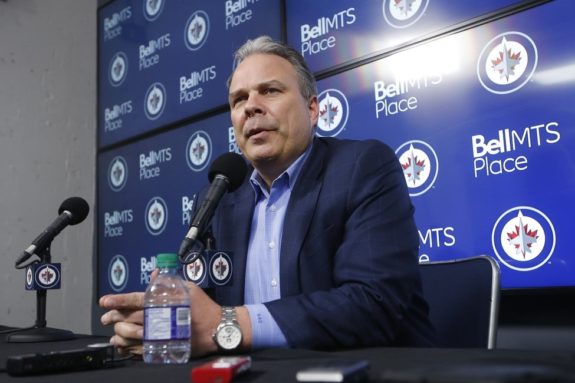
Even a team like the Jets, capable of executing the draft-and-develop model to near perfection and adept at finding hidden gems in deep rounds, can only do so much without first-round picks. We explored the Jets’ need to pile up prospects again earlier this month when analyzing whether the Jets could trade Trouba to the New Jersey Devils.
With a first-round pick, THW’s own Brandon Share-Cohen’s Top 250 rankings indicate the Jets may be able to snag Barrie Colt centre Ryan Suzuki, Djurgarden IF d-man Tobias Bjornfoot, or Halifax Moosehead right-winger Raphael Lavoie.
Trade Snags Jets Potentially Impactful Defenceman
Trouba he is not, but Neal Pionk, the 23-year-old right-hander coming out of his first full NHL season, has plenty of potential.
An undrafted Minnesotan who the Rangers snagged from the University of Minnesota-Duluth Bulldogs back in May 2017, put up six goals and 20 assists in 2018-19, skated in 73 games, dished out 138 hits, blocked 98 shots, and skated 21:10. He also saw time on special teams.

Pionk’s been praised for his skating and puck-moving ability, at both the college and pro levels, and has no qualms about playing the body. At just 23-years-old and with only 101 NHL games under his belt, he has not reached his ceiling yet, but has put the league on notice with electric plays such as this one:
While Pionk’s possession and isolated impact numbers were poor in 2018-19, it will be interesting to see what he can do when he’s a year older and on a more fundamentally sound team than the 32-26-14 Rangers.
“He’s a young player that we believe has upside that is going to continue to grow,” Cheveldayoff said during a conference call Monday night. “He’s got 100 games in the NHL. He’s someone that we think, given the group of players that we have here in our organization from a forward standpoint, that he’s going to complement very, very well. Obviously, with moving Jacob, a door does open for him here.”
Trade Gives Jets Better Financial Picture
Now that the Jets officially know they have $7 million — the figure they would have given Trouba if he was interested in signing long-term in Winnipeg — at their disposal, they can begin negotiating with their high-profile free agents.
It’s a long list, punctuated by players expecting big money, most notably Patrik Laine and Kyle Connor, whose entry-level deals both expire on July 1. There’s also Tyler Myers, Brandon Tanev, Ben Chiarot, Andrew Copp, and a few others.
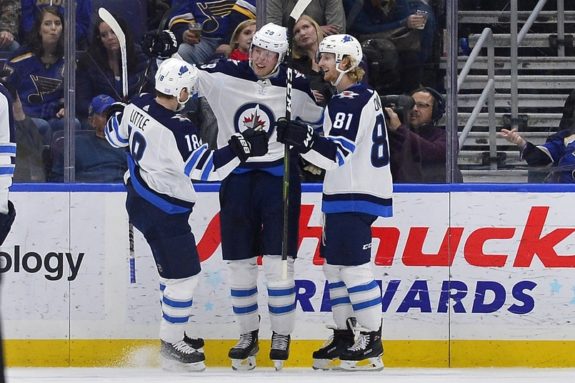
One of the best things about the trade may turn out to be the timing. Trading Trouba before the draft makes the Jets’ financial picture a lot clearer in terms of who and what they can afford to pay and will allow them to get a head start on negotiations.
Ideally, they’ll be able to get their RFAs locked up long before, so there’s no panic like there was last summer when Josh Morrissey didn’t sign until after training camp opened.
Trade Finally Ushers Out Trouba’s Tumultuous Tenure
Trouba will be remembered in Winnipeg for being good on the ice but bad off of it.
He held out in 2016, asked for a trade and missed more than a month. He took the team to arbitration in 2018 and still wouldn’t budge when it came to dollars and cents. When he might be traded and his status as a pending RFA was a distraction all through 2018-19, something the Jets didn’t need given how badly they floundered down the stretch. Those bad vibes are on their way out of town alongside Trouba’s sticks and skates. Addition by subtraction they call it.
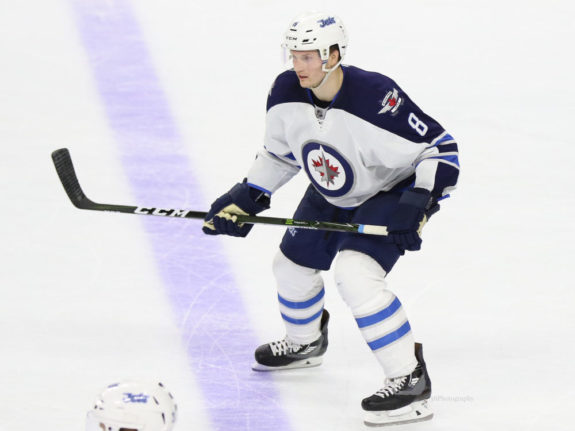
He was never going to stay, preferring a bigger U.S. market instead. Trouba attributes that desire to his fiancee who is training to be a doctor and wants to practice medicine in the U.S.
However, Brandon Share-Cohen was bang-on when he wrote, “the Jets never truly felt like the long-term home for the 6-foot-3, 202-pound blueliner.”
Unfortunately, other teams knew how much the Jets desired to ditch Trouba and his baggage. This made it a buyer’s market and hampered the return.
Disappointment? Potentially. Disaster? Probably Not.
Yes, the Rangers are the immediate winners of the Trouba trade. No, it doesn’t seem the Jets got enough in return. However, it’s overly simplistic to say, as Scott Billeck did, that, “the Jets (lost) this trade in a bad way.”
That cannot be determined yet. Trouba could get injured. Pionk could excel in a new market with new opportunities. Whoever the Jets take at 20th-overall could have a Kyle Connor-esque level of impact.
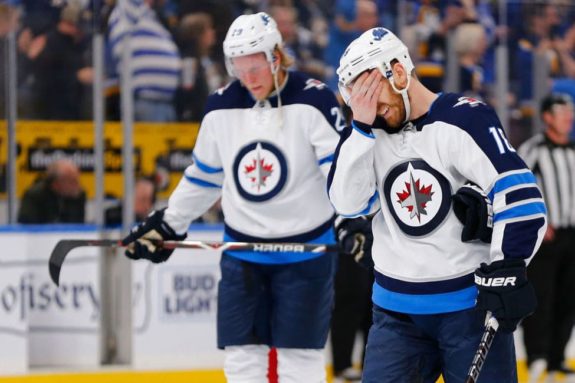
While, at first glance, it seems like a disappointing trade for the Jets, the positives are illuminated when you look closer.